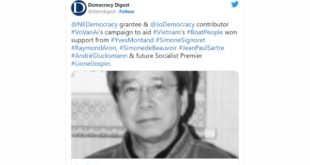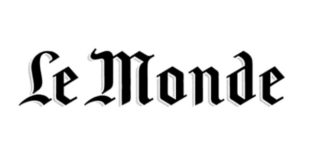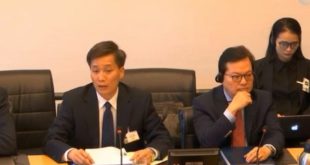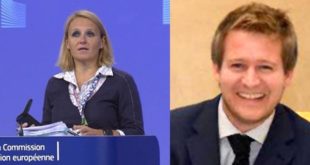HANOI, Jan 18 (AFP) – In the shadow of a large longan tree at a pagoda in Hanoi, an elderly Buddhist monk hopes to tell a few home truths : Thich Nhat Hanh has returned to Vietnam after 38 years’ exile in France — and has become the centre of a religious and political storm.
As the head of a delegation of about 200 followers, mainly French and American, he is on a three-month visit to the tightly controlled communist country he left in 1967 and where his works and recordings have long been banned.
“My trip is not political,” says the 78-year-old, draped in a dark orange robe. But his comments seem to suggest quite the opposite.
Until recently, “There was fear and suspicion here. There was a need for much communication to transform, to remove erroneous perceptions,” Hanh tells AFP in an interview, surrounded by Vietnamese journalists and attentive officials.
“We have been able to breathe easier these last years,” he says.
But for some Buddhists in this country, life can still be difficult.
The Unified Buddhist Church of Vietnam (UBCV) has been banned since 1981 for refusing to submit itself, along with all of its churches around the country, to the supervision of the Vietnamese Communist Party.
Several of the UBCV’s members, including its two most senior figures, have since spent most of their time in prison or under house arrest.
Thich Huyen Quang, 87, and his deputy Thich Quang Do, 76, are accused by Vietnamese authorities of possessing “state secrets” and are de facto under house arrest in two separate pagodas.
Hanh chooses his words carefully.
“We want to listen carefully to understand the reality,” the monk says in French. “Our policy is to listen to everyone, the Buddhists who are not happy and the governmental agents who are facing difficulties.”
On Monday the monk held talks with members of the committee on religious affairs, a government body in charge with cultural and religious issues. “I asked them to be patient (with UBCV),” he says, smiling.
“Sometimes, one needs months to sit down and talk.”
Will he be allowed to meet with members of the banned church ? “I hope so,” he says. “Our enemy is discrimination and fear.”
Constrained by exile in 1967 by southern Vietnam’s pro-American regime, the monk obtained asylum in France, where he taught at Paris’ prestigious Sorbonne University.
In 1982 he settled in southwestern France and founded a new community. The author of 100 works, he preaches a new form of Buddhism, adapted for modern society and able to lure younger generations and to protect them from materialism.
But not everyone is keen on his methods.
For the Paris-based International Buddhist Information Bureau (IBIB), the UBCV’s communication arm, Hanh’s visit amounts to a “Faustian pact” with the country’s communist dictatorship.
“This highly publicized visit could be interpreted as a sign of increased religious tolerance in Vietnam,” the IBIB complained.
“This Faustian pact between Thich Nhat Hanh and the Vietnamese authorities enables (him) to promote the development of his own sect.”
On leaving Paris, one of Hahn’s close associates had accused certain banned religions in the country of hiding “flags of the old regime” of southern Vietnam, which was beaten by the communist north in 1975.
The statement was not very well received by IBIB, which said it smacked of propaganda.
“Thich Nhat Hanh gives a precious propaganda bonus to the Vietnamese regime. But he does nothing for the cause of religious freedom and human rights in Vietnam,” says Vo Van Ai, the group’s president and sworn enemy of the Hanoi regime.
“It’s a matter of perception,” the elderly monk answers.
He will not say any more.
“It’s for the politicians and the journalists to say if there are enough religious freedoms in Vietnam. You can judge by yourself without needing a declaration from us.”
On Monday the state Vietnam News Agency welcomed the monk’s visit, saying : “Thich Nhat Hanh praises Vietnam’s open-door policy on religious beliefs.”
 Quê Me Quê Me: Action for democracy in Vietnam & Vietnam Committee on Human Rights
Quê Me Quê Me: Action for democracy in Vietnam & Vietnam Committee on Human Rights




